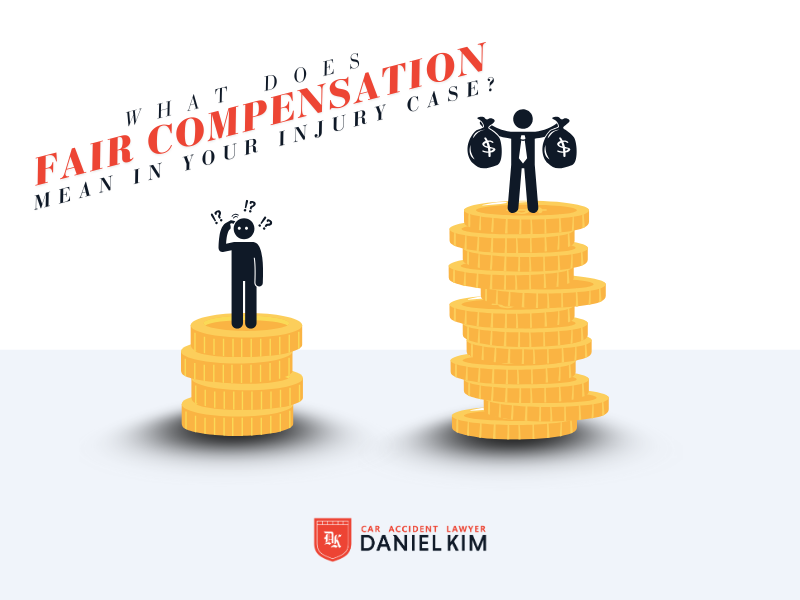Compensation for Personal Injury
You may be eligible for compensation if you’ve suffered a personal injury, whether physical or emotional, because of someone else’s negligent actions. Not only is it important to understand what that means, but it’s also essential to fully understand how much personal injury cases are worth.
Here is everything you need to know about successfully recovering damages (and how a personal injury lawyer can help).
TALK TO A LAWYER
Types of Personal Injury Cases
Personal injury law covers any injury caused by a person or entity’s intentional, negligent, or reckless behavior. Some of the common causes of personal injury cases are:
- Car crashes
- Truck accidents with commercial vehicles
- Motorcycle wrecks
- Bicycle accidents
- Nursing home abuse
- Slip and fall accidents
- Dog bites
- Medical malpractice
- Pedestrian accidents
Due to the seriousness of these types of accidents, personal injury victims often suffer from severe injuries, such as traumatic brain injury and post-traumatic stress disorder. These injuries affect a person’s life permanently and result in steep medical bills, an inability to return to work, and much more.
The goal of a personal injury claim is to provide financial compensation for personal injury victims to make themselves “whole” again.
Understanding Damages in a Personal Injury Claim
The compensation you can get in most personal injury claims depends on the severity of harm, the time to recover, the cost of all medical expenses, and all other costs incurred due to the accident.
Below is a breakdown of what you can expect from a personal injury settlement by working with an accident attorney:
Compensatory Damages
Compensatory damages are meant to compensate a victim for any harm or wrongdoing. There are two types of compensatory damages: economic and non-economic.
- Medical expenses
- Lost income
- Pain and suffering
- Permanent disability
- Property damage
- Emotional distress
Keep in mind that fair compensation covers all expenses you may encounter during your recovery. This includes any physical and emotional pain that was suffered following the incident. And, if your injuries are severe enough to cause a long-term disability, you could be eligible for further personal injury compensation.
Many other reimbursable areas, like lost wages, are often overlooked and are just as important to recover. If you’ve lost money because you couldn’t work, it’s more than reasonable to ask for compensation. However, such losses must be proven. These all come together to form a personal injury damages formula.
Punitive Damages
Punitive damages are separate from compensatory damages. They can be added to a personal injury settlement if the defendant’s conduct was found grossly negligent or intentional. They are awarded when compensatory damages are considered insufficient.
What Is a Damage Formula?
It’s a method for formulating the amount of damages the accident caused a victim. In addition to monetary debt, the loss of social, family, or educational experiences and any emotional damages play into this formula. While there is no exact formula for damages, losses can be determined with an experienced personal injury attorney’s help.
At the start of your personal injury claim, an insurance company or adjuster will add up the total medical expenses to treat all sustained injuries. This is the start of figuring out how to compensate for the claim. Medical damages are referred to as “special,” and other damages are called “general damages.”
The adjuster should multiply special expenses by 1.5-3 times the expenses for minor injuries and up to 5 or more for more severe and long-lasting injuries. They will add this to the cost of lost income, and this number becomes the basis for settlement negotiations.
What Is Fair Compensation?
Fair compensation should cover both past and future medical bills. For example, the insurer should consider whether you need a treatment plan, future pain management, or physical therapy. There are two things to keep in mind with damages formulas.
- One is that the value calculated through the formula is just the starting point. It doesn’t have to be the end number; it should rarely ever be. You are more than justified in adding your legal expenses to this number.
- Second, several things play into the final damages formula, and all contribute to the final settlement, or compensation, given.
For example, the more painful your injury, the higher the formula should be. The more invasive your treatment, the larger your compensation should be. And finally, the more visible and scarring your injuries are, the more you should receive as part of your personal injury claim.
Ultimately, fair compensation must account for more than covering immediate costs. Long-term physical and emotional damage must also be taken into consideration.
Personal Injury Claims FAQ
How Long Can a Lawsuit Take?
This is an important question, as there is no one exact answer. The time to settle a case will depend entirely on several factors. The key factor is the time it takes for you to recover. For less serious injuries where liability is apparent, you could expect it to take a few months or less. However, more severe personal injury cases involving amputation, extensive surgery, and rehabilitation could take years and even go to trial.
Additionally, if the insurance company is unwilling to offer a settlement (and many will be unwilling), your attorney will need to file a lawsuit to get them to agree to a fair amount. Because every car accident is unique, there isn’t an exact figure, but working with a personal injury attorney will improve your chances of maximizing compensation.
How Are Personal Injury Lawsuits Paid Out?
Once all parties have come to an agreed amount, the matter of payment takes precedence. The insurance company will pay the money out over time, which could help you cover ongoing expenses related to the accident. They could also offer a lump sum typically reserved for smaller amounts.
In large cases, it’s more likely that the insurer will pay out over time, which protects both them and you. Like anything in a personal injury case, it depends on several interconnected variables. The process can become very complicated.
Is There a Limit to the Amount of Personal Injury Compensation I Can Receive?
In California, there is no cap on economic damages in personal injury cases. You are entitled to recover the full extent of your actual financial losses. There are limits to non-economic damages in medical malpractice cases.
What Is the Average Personal Injury Settlement?
Personal injury compensation can vary widely, from a few thousand to millions of dollars. It all depends on the severity of the accident, the resulting injuries, the degree of negligence, and the impact of the injuries on the victim’s life.
Be wary of “personal injury calculators” that claim to give you an accurate estimate of your claim’s value. The only way to truly know how much compensation you are entitled to is by speaking with a personal injury attorney.
How a Personal Injury Lawyer Can Help You
Insurance companies are notorious for paying out as little as possible, often to your detriment. An experienced personal injury lawyer can make sure you’re getting the fair compensation you deserve. Sometimes, an insurance company will even invalidate your personal injury claim and refuse to pay a settlement.
In these cases, you need a lawyer. In fact, it is highly recommended that you consult with an as soon as possible to avoid jeopardizing your claim. Working with a personal injury lawyer means you have someone in your corner at every step of the way.
You want someone to fight for you, not against you. Contact The Law Offices of Daniel Kim to learn how to best approach your case and get the fair compensation you deserve.
START YOUR FREE CONSULTATION


